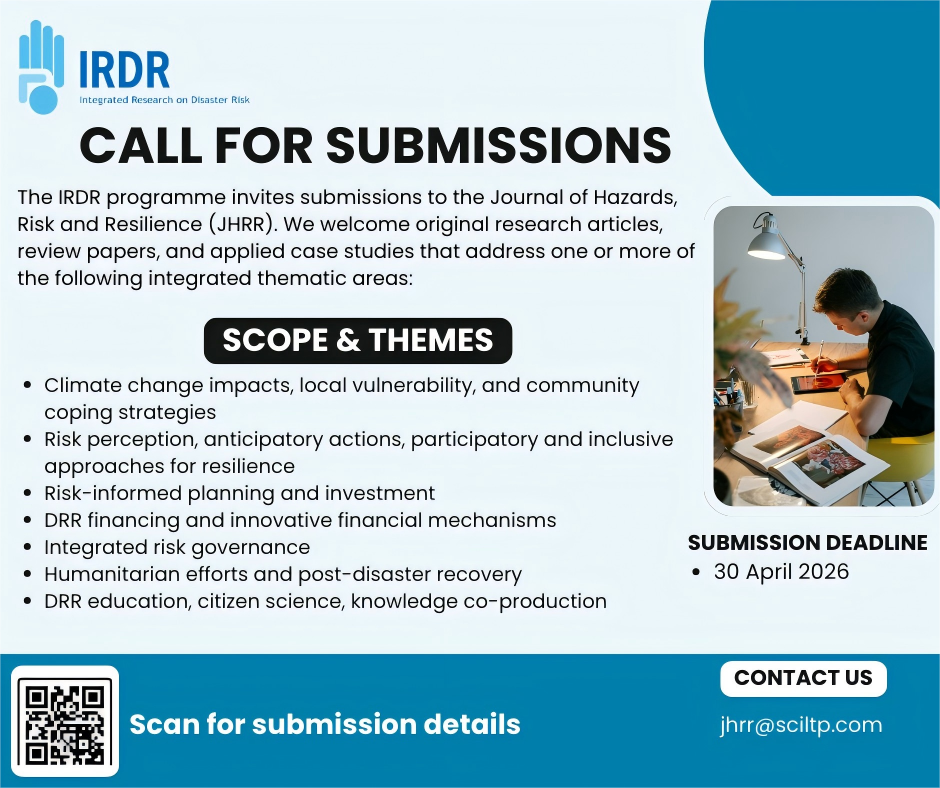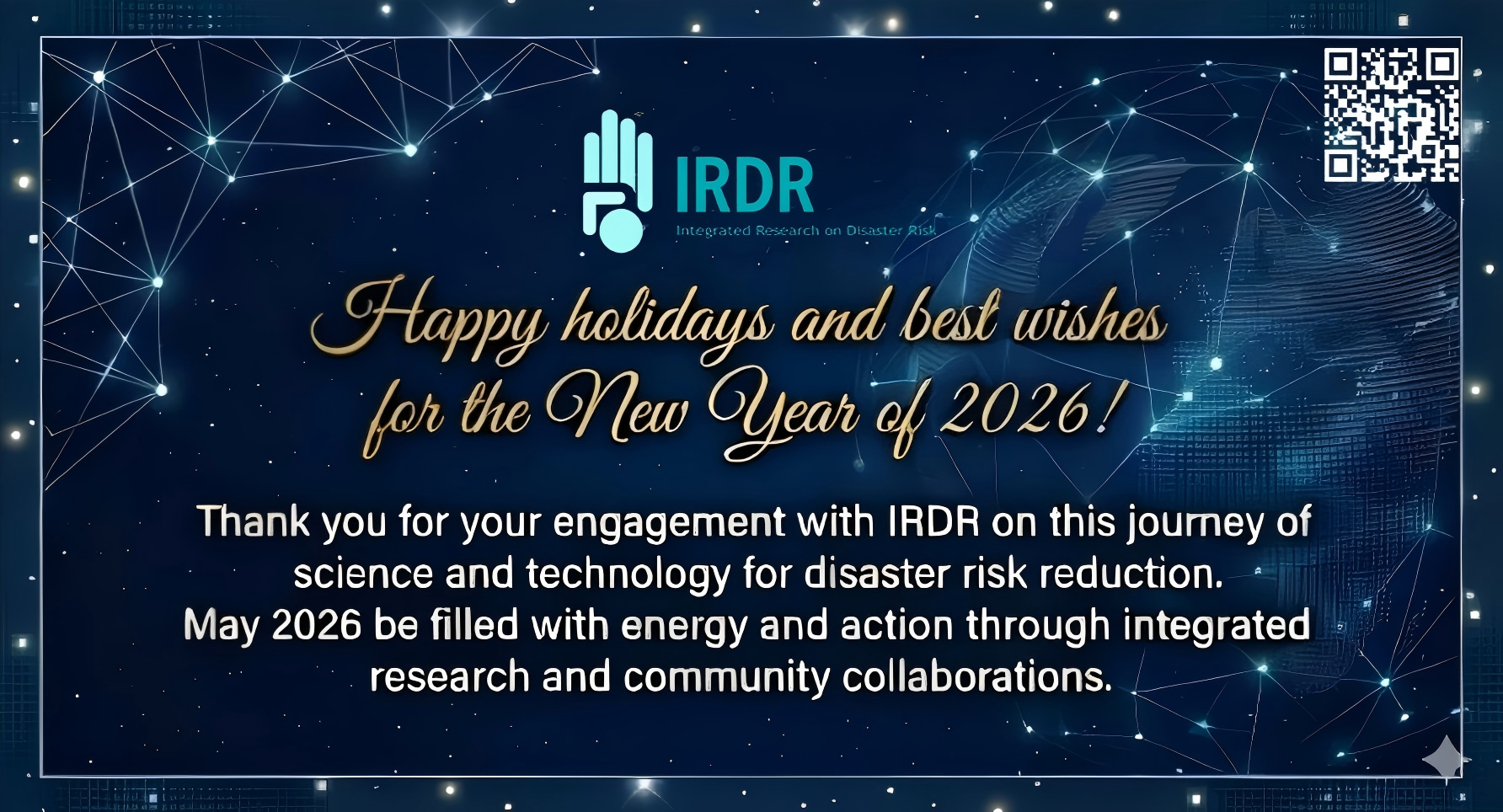BEIJING – The second Integrated Research on Disaster Risk (IRDR) Conference opened today, 7 June, at the Beijing International Convention Centre in central Beijing. With the theme ‘Integrated Disaster Risk Science: A Tool for Sustainability’, the event has attracted over 200 participants from over 40 countries.
The Opening Ceremony was initiated by David JOHNSTON, Chair of the IRDR Science Committee and Director of the Joint Centre for Disaster Research from Massey University in New Zealand. JOHNSTON introduced the opening ceremony speakers which included Qin ZHANG, Vice President and Executive Secretary of China Association for Science and Technology, Huadong GUO, Director General of the Institute of Remote Sensing and Digital Earth (RADI), Chinese Academy of Sciences, Steven WILSON, Executive Director of the International Council for Science (ICSU) in France, Fengmin KAN, Head of the United Nations International Strategy for Disaster Reduction (UNISDR) Regional Office for Asia and the Pacific and Hanlin LI, Director General of the National Institute of Social Development, Chinese Academy of Social Sciences (CASS) for the International Social Science Council (ISSC).
In his opening speech, Qin ZHANG emphasized the importance of disaster prevention within the Chinese government’s programs. Recognizing that disasters impact people’s lives and properties, the Chinese government has integrated disaster prevention into the country’s economic and social development plan. To support this, many research and engineering projects in this area have been set up. As a result, there has been remarkable progress in disaster research providing basis for the Chinese government to make decisions in preventing disasters.
Director General Huadong GUO from the Institute of Remote Sensing and Digital Earth (RADI), Chinese Academy of Sciences (CAS)also mentioned that the Chinese scientific community has been actively promoting and carrying out comprehensive research on disaster risks and risk control, and providing a scientific basis for governments at all levels to make decisions concerning disaster mitigation. Currently, RADI serves as the host institution of IRDR IPO and plays a crucial role in the monitoring and assessment of disasters using space technology.
Another speaker, Steven WILSON, Executive Director of the International Council for Science (ICSU), shared how the programme that was to become IRDR was the brainchild of ICSU during the first decade of the millennium. Picking up from the title of this IRDR Conference – Integrated Disaster Risk Science: a Tool for Sustainability, WILSON underlined the link between disaster risk and sustainable development. Scientific research and practitioner experience have clearly shown that disasters, development and poverty are intimately linked. The destruction of property and livelihoods as a result of disaster events can have far-reaching effects on local and national development gains. “Stepping up to the challenge with respect to disaster risk reduction, ICSU itself has been invited to be Organizing Partner of the Third World Conference on Disaster Risk Reduction in Sendai, Japan next March on behalf of the Major Group Science and Technology. This is a role that ICSU have played in the Rio+20 process and currently in the negotiation of the Sustainable Development Goals,” WILSON said.
In her speech, Fengmin KAN, Head of the United Nations International Strategy for Disaster Reduction (UNISDR) Regional Office for Asia and the Pacific Bangkok, mentioned that as a sponsor of the IRDR International Programme, the organization has shared the same views on the much-needed science basis for effective risk reduction. KAN emphasized the need for science and technology in improving our capacity to address the impact and risk of disasters. The UNISDR Advisory Group on Science and Technology for disaster risk reduction – through their case studies – have demonstrated that science is useful, usable and used in reducing risk and building resilience in various countries. “In recent years, lessons from Hyogo Framework for Action (HFA) implementation revealed the critical need to address risk drivers – to halt the increase in climate-related losses, and other physical and economic losses. To address such critical needs, the post-2015 framework for disaster risk reduction will focus on three complementary strategic areas: 1) risk prevention (which pursues development pathways that minimize disaster risk generation); 2) risk reduction (reducing the existing accumulations of disaster risk); and 3) strengthened resilience (enabling nations and communities to absorb loss and damage, minimize the impacts of disasters, and move forward in socio-economic development in their aftermath),” KAN said. To achieve risk resilience, a stronger participation by the science and research community is required, providing science and evidence-based support to public and private policy makers for risk-sensitive investment. KAN highlighted the urgent need for science and the research community to strongly inform policy and practice for disaster risk reduction.
Hanlin LI, Director General of the National Institute of Social Development, Chinese Academy of Social Sciences (CASS) for the International Social Science Council (ISSC) said that disasters broke down social relations, and created emotional and social panic among the affected people. “As disasters bring not only physical damage, but social damages as well, they destroy the function and structure within a society and community. Disasters tear social relations apart and place people in confusion. Compared to rebuilding physical damages, it takes longer time and greater patience to help people recover from social wounds. This is the reason why ISSC is part of the IRDR programme and took on the role as one of three Co-Sponsors in this programme,” LI said. Through this IRDR conference 2014, social scientists and natural scientists are given the chance to meet in person and engage in a constructive discussion and dialogue to pave the way for an effective cooperation between social and natural scientists on disaster research.
For more information about the Conference, including the programme for the three days, visit the IRDR website at http://www.irdrinternational.org/conference/ or contact: connect@irdrinternational.org.







